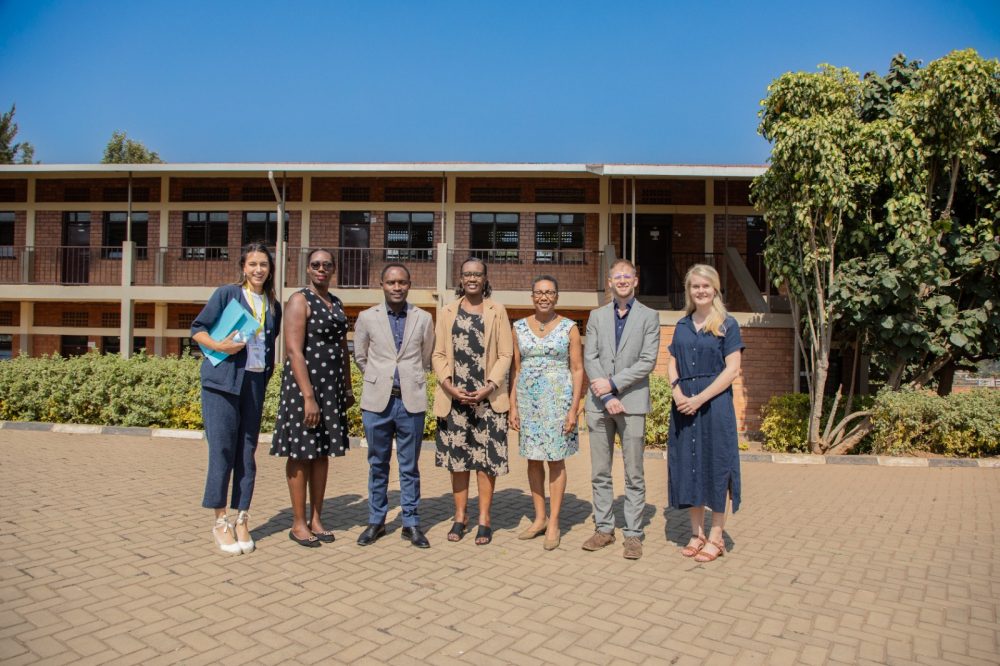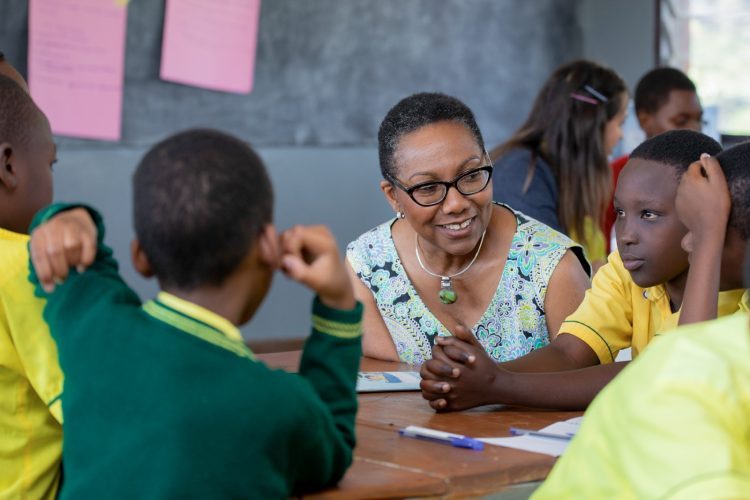A UK Special Envoy who is in Rwanda to attend the 2023 Women Deliver conference has recommended Rwanda for the progress made in English learning and giving girls spaces to build their self-awareness and confidence.
On the 2nd day of her visit, Alicia Herbert, OBE, the Foreign; Commonwealth & Development Office (FCDO) Director for Education, Gender and Equality visited the Building Learning Foundations (BFL) Programme offices in Rwanda to get firsthand updates on the impact of the programme in the country.
The envoy visited Girls club activities presented by different pupils who benefit from the BLF programme activities who gathered EPAK Bon Bosco School, one of the 42 schools across 10 districts supported by the UK government through the Education Development Trust (EDT).
Girls’ clubs are designed to provide a space to tackle barriers specific to girls, like developing life skills, empowering girls (and boys) to make informed decisions about school and their future, as well as building confidence, self-esteem and personal resilience.
At the school, she was met by the Director General in the Ministry of Education (MINEDUC) in charge of Policy Analysis Rose Baguma, EDT’s Regional Director Richard King and BLF’s Team Leader, Silas Bahigansenga.
Director General Rose Baguma said: “To achieve gender parity in education we have done is the review of the Girls education policy which EDT has been supporting us with through FCDO.
We believe that the Girls’ Education Policy will serve as a roadmap to achieving quality education for all. The main reason we reviewed the policy was to ensure that it aligns with the global trends and national priorities.

The Ministry of Education has been working with BLF to create an enabling system for the Girls education work in Rwanda. The system that is not only ready develop policy but also implement it and remove barriers that affect girls such stigma, social norms, violence, poverty among others”.
Alongside that, BLF has also been testing an approach to establish girls’ clubs in schools.
Baguma said, “the clubs have been very effective to provide a safe space where life skills are taught and discussed in order to empower both Girls and boys to make informed decisions about school and their future, as well as building their confidence, self-esteem and personal resilience”
Mathias Sindayigaya, the Head Teacher of GS Mburabuturo and a BLF Local Leader of Learning spoke about how the programme has supported teachers of English and Mathematics in his school.
Sindayigaya stated that BLF has been training his English and Mathematics teachers in P1-P5, but also received mathematics essential learning materials and text books that are helping learners and teachers in language proficiency and counting.
“BLF introduced a very good programme of Girls clubs to my school which is really empowering the most vulnerable girls to become better performers in school, have increased self-esteem and confidence,” Sindayigaya said.
Alicia Herbert was later led to witness Girls club activities where she interacted with members learning a session on confidence building and self-esteem. The girls were discussing characteristics of people with high and low self-esteem, self-awareness, issues around gender based violence and ways to prevent abuse.

Speaking to the girls Alicia said: “Thank you for making time to host you in your club.I am glad that you all like the club activities. I encourage you to please stay in school so that you can be able to achieve your dreams in future”
Alicia appreciated the efforts of the government of Rwanda for making great efforts in advancing gender equality and women’s empowerment in general.
Since 2021, BLF has piloted Girls’ Clubs in 42 schools across 10 districts in Rwanda. It is planned that after the pilot, and after the Girls’ Club curriculum has been finalised, the approach will be scaled up for all schools in Rwanda as part of a whole school approach to gender.
“I was in Rwanda in 2018 when the language of instruction was recently changed to English and I could see how difficult it was for the teachers and learners, but coming back here a few years later, I am impressed to see that across P1 to P3 performance in English and Mathematics by over 57% thanks to the FCDO funded programme that has worked with your Ministry to make this happen” Alicia noted.
Building Learning Foundations is a UK aid-funded programme to establish the foundations for learning at primary level in all public and government-aided schools. It is focused on early grade English and numeracy, and began in July 2017 and is due to end in September 2023.
Early endline results show that gains in English subject were greatest for P3; a 66% increase from baseline of 17% to 83% by endline. Boys and girls continued to perform similarly in English (77% of boys grade proficient compared to 76% of girls)
While in Mathematics performance doubled, with an average 23% increase in the proportion of grade proficient learners from baseline 16% (2018) to endline 39% (2023), with the biggest gains between progress III and endline (33% in two years) after a noticeable decline (from 19% at progress II to 6% at progress III. – associated with the shift in language of instruction in 2021. Gains in Maths were greatest for P1; a 35% increase from baseline of 36% to 71% by endline.




















